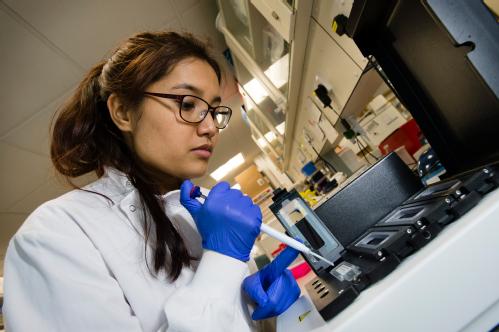Funded Studentships
Midlands Integrative Biosciences Training Partnership (MIBTP)
MIBTP has an ambitious vision to deliver innovative, world class research across the Life Sciences to boost the growing Bioeconomy in the Midlands and across the UK.
PhD Studentship projects will be focused in vital research areas such as food security, bio-energy and quantitative biology. Students from a wide diversity of academic backgrounds are encouraged to apply.
Projects are available for those with creative drive in both theoretical (IT and mathematical) and experimental (biology, biomedicine, chemistry, biotechnology) research.
Midlands Integrative Biosciences Training Partnership

Environmental PhD Studentships
Central England NERC Training Alliance (CENTA)
CENTA is a consortium of Universities and research institutes that are working together to provide excellence in doctoral research training
As a CENTA student, you will belong to a consortium well resourced to provide you with extensive training to give you confidence in all aspects of your research.
CENTA PhD Studentships

EPSRC CDT in Modelling of Heterogeneous Systems - HetSys
HetSys recruits students from across physical sciences, mathematics and engineering who enjoy using their mathematical skills and thinking flexibly to solve complex problems. By developing these skills HetSys trains people
to challenge current state-of-the-art in computational modelling of heterogeneous, ‘real world’ systems across a range of research themes such as nanoscale devices, new catalysts, superalloys, smart fluids, space plasmas etc.
HetSys Centre for Doctoral Training
MRC-funded Doctoral Training Partnership (MRC DTP)
We are offering ten 4-year PhD studentships to talented and highly motivated undergraduate students interested in Microscopy and Image analysis.
Supervised by internationally leading experts from Warwick Medical School and the School of Life Sciences, this four year PhD programme brings together cutting-edge imaging technology with innovative data analysis to address a range of biomedical research questions in Cellular Dynamics, Neurobiology and Infection. The aim of this programme is to provide tomorrow's research leaders with the quantitative imaging skills that will lead them to a better understanding of human disease and to the design of new diagnostics and therapies.
MRC Doctoral Training Partnership

Collaborative Training Partnership (CTP) for Sustainable Agricultural Innovation
The CTP programme for Sustainable Agricultural Innovation (CTP-SAI) is a ground breaking partnership between leading businesses, charities and research providers to offer outstanding training for the agri-food sector.
CTP PhD positions are now available. These exciting projects cover a range of topics including genetics, agronoby, pathology and entomology and data science.
BBSRC CTP-SAILink opens in a new window



